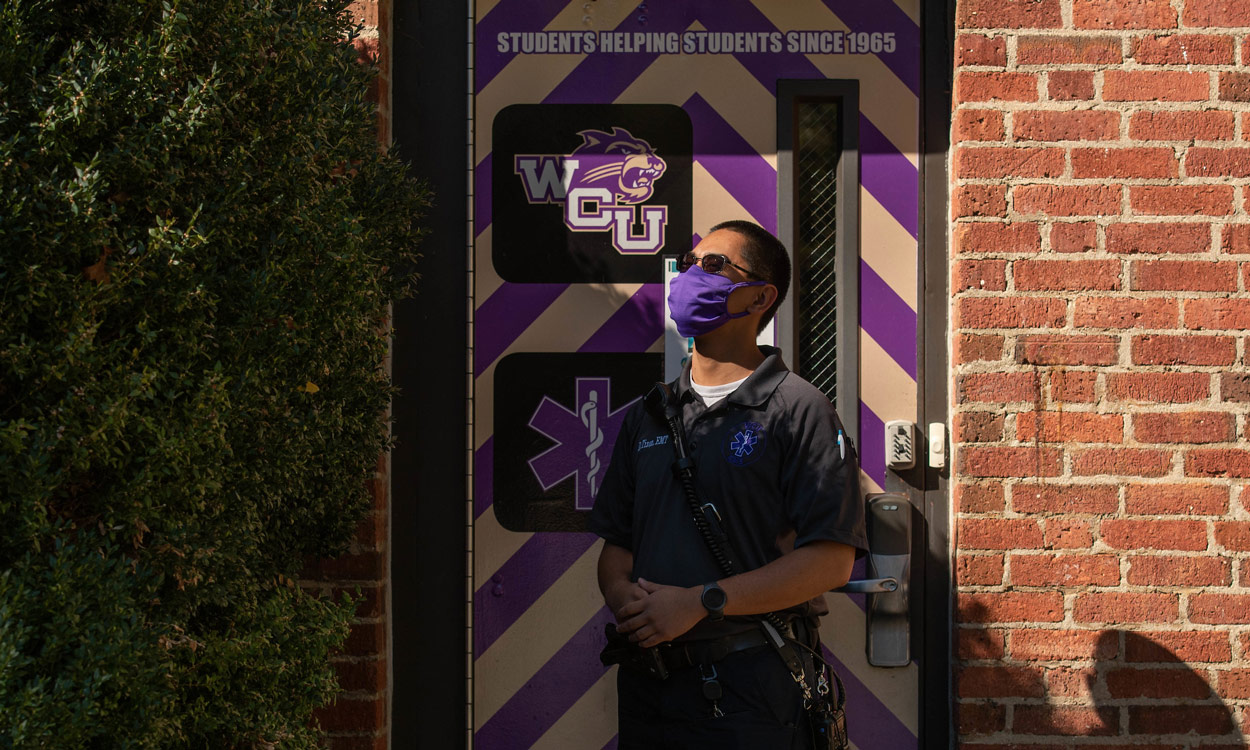UNC System institutional survey of faculty, staff reflects attitudes on campus

Kenny Messer (second from right), a WCU trustee and 1986 alumnus of the university, and now-former trustee Ed Broadwell (right) visit with employees during a recent Employee Appreciation Day luncheon. Dimensions examined in the UNC survey included factors such as whether employees at the system institutions feel appreciated.
Western Carolina University faculty and staff feel pride in the institution, satisfaction in their jobs and that they aren’t getting paid nearly enough, according to the results of an employee engagement survey conducted by the University of North Carolina System.
UNC officials have released aggregated results for all 17 system schools as a whole, as well as for each constituent institution. The survey was performed by ModernThink, an organizational development and management consulting firm that has implemented similar studies for hundreds of colleges nationwide and for the Chronicle of Higher Education. A WCU summary may be seen at 2018 UNC System Employee Engagement Survey - Summary of Results.
An overview of survey results was presented to university leadership groups, including the Chancellor’s Leadership Council, Board of Trustees, Faculty Senate and Staff Senate.
Individual responses to the UNC System survey were kept confidential and allowed for honest, straightforward assessments, said Cory Causby, WCU associate vice chancellor for human resources. The data collected will help guide human resource policies at the system and state level and provide a means to identify challenges and address potential workplace issues at the individual 17 institutions, Causby said.
Dimensions examined in the survey include job satisfaction and support, collaboration, respect and appreciation, and pride and fairness. The survey aligns with the goals of WCU’s strategic plan, “2020 Vision: Focusing on Our Future,” Causby said.
Among all the institutions, WCU had overall positive responses of 68 percent, second only to the N.C. School of Science and Mathematics. The UNC System’s average positive ratings was 63 percent.
The survey administrator framed WCU results from the perspective of “strengths” and “opportunities,” particularly as the findings compared with peer institutions, with the following observations:
Strengths
- Job fit, autonomy and connection to mission
- Professional development
- Supervisor/department chair competencies
- Senior leadership
- Shared governance
- Diversity, equity and inclusion
Opportunities
- Resource constraints
- Performance management/accountability
- Communication
- Collaboration
- Work/life balance
WCU had a 55 percent participation rate in survey response, compared to a 50 percent average by the collective UNC System institutions.
In the survey response to “This institution’s culture is something special you don’t find just anywhere,” the overall UNC System reported 59 percent of respondents agreed, while WCU faculty and staff agreed at a 77 percent rate.
WCU had a 72 percent favorable response to “The role of faculty in shared governance is clearly stated and publicized,” contrasted to a 57 percent by UNC System institutions.
In the category “I am paid fairly for my work,” WCU had a 31 percent positive and 42 percent negative response, while the UNC System reported 39 percent positive and 47 percent negative.
“The recent UNC Employee Engagement Survey mirrors local efforts to collect feedback about employee engagement and job satisfaction,” said Alison Joseph, WCU Staff Senate chair-elect. “WCU’s Staff Senate has been surveying staff members across campus biennially since 2013 about employee engagement and job satisfaction, working relationships and supervision, work-life balance, diversity and work environment.”
The data collected through the span of the Staff Senate survey effort show increasing staff satisfaction and agreement with the results of the UNC System survey across virtually all categories, Joseph said.
“Staff Senate has approached the project with two main objectives: to provide employees a mechanism for submitting feedback about their work experience that can be used in the aggregate by campus leadership, and to advocate for specific programming or initiatives that will address areas where there is an identified opportunity for growth,” she said. “The Staff Senate applauds the efforts of the UNC System for providing employees throughout the state the opportunity to communicate about their engagement, satisfaction and other facets of work life.”
For more information about WCU’s responses in the survey, contact Causby at causby@wcu.edu.

